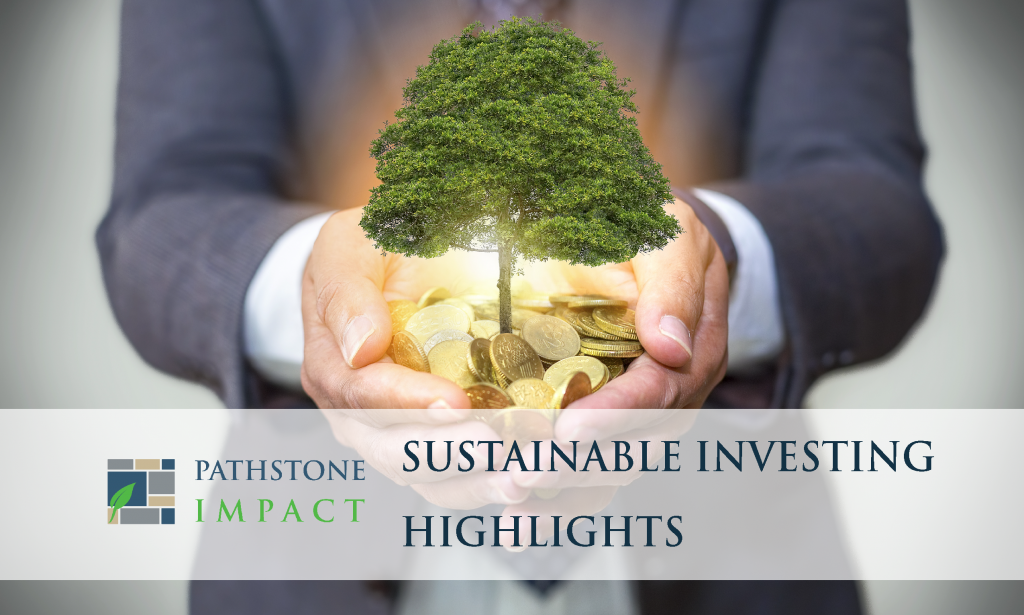Sustainable Investing Hit $17.1 Trillion in 2020, a Huge Jump of 42% from 2018
Assets that are considered to fall within the realm of “sustainable investing” increased to $17.1 trillion at the beginning of 2020, a massive jump of 42% from 2018, cites the Forum for Sustainable and Responsible Investment (US SIF) Trends Report. The trends report “provides data on the U.S. asset management firms and institutional asset owners using sustainable investment strategies and examines the ESG issues they consider in managing their portfolios. The foundation researched 384 money managers, 1,204 community investing institutions, and 530 institutional asset owners.” Conflict risks, climate change and carbon emissions, tobacco, board composition, sustainable natural resources, agriculture, and executive pay are identified as major trends. Environmental, social, and governance (“ESG”) issues are gaining more attention and driving sustainable investing assets to a record high.
Conflict risk accounted for $2.73 trillion in assets and is the top ESG criterion institutional investors incorporate into their investment. The US SIF found that most investors who applied this criterion were addressing issues in Sudan and Iran [Since the US SIF report came out on November 13, 2020, the United States government, as of December 14, 2020, rescinded Sudan from its list of a state sponsor of terrorism. According to the States Department, this represents a fundamental change to the United bilateral relationship between Sudan and the United States]. The report noted both countries are on the U.S. State Department’s list of state sponsors of terrorism. Climate change and carbon emissions are other leading ESG criteria institutional investors incorporate in their investment portfolios. According to US SIF, between 2018 and early 2020, climate change-related assets increased from $2.24 trillion to $2.61 trillion and are expected to experience more traction in the future. Other top issues captured in the US SIF trends report were labor issues, up 40% since 2018; board issues, up 12%; and tobacco, up 29%.
ESG and the Biden Presidency
As President-Elect Joe Biden takes office on January 20, 2021, environmental, social, and governance (“ESG”) proponents are optimistic about the incoming administration views and policies favorable to sustainable and impact investing. Plans to address the challenges of climate change with a large investment in clean energy, return to the Paris Agreement, and the possibilities of U.S. ESG rule alignment with those of Europe are among major contributing factors to the optimism.
Investors are increasingly considering the severe impact of climate risk as part of their investment decisions. The incoming administration’s climate change plan includes a large investment in clean energy and rejoins the Paris Agreement. The Biden clean energy plan would be driven by innovation, one that provides for robust investment in “battery storage, negative emissions technologies, the next generation of building materials, renewable hydrogen, and advanced nuclear – and rapidly commercialize them, ensuring that those new technologies are made in America.” By rejoining the Paris Agreement, the United States under the Biden administration would recalibrate the United States’ position towards setting voluntary targets to reduce its domestic emissions.
The United States has not required publicly traded companies to disclose their climate risks and emission levels to the same degree as many other developed countries. The incoming administration is expected to push for a rule that would require “public companies to disclose climate risks and the greenhouse gas emissions in their operations and supply chains.” Similarly, ESG reporting has gained calls from influential investors seeking greater uniformity of ESG reporting and framework. Furthermore, the current Securities and Exchange Commission (“SEC”) commissioners are more willing to move beyond principles-based disclosures to “more standardized, prescriptive line item requirements for disclosure on key areas such as diversity and human capital management, climate change and sustainability.”
NASDAQ Pushes for Board-Diversity Through New Proposed Listing Requirements
NASDAQ Inc. has filed with the Securities and Exchanges Commission (“SEC”) to adopt a proposed new rule that would require publicly traded companies listed on its exchange to include women, racial minorities, and LGBT individuals on their boards and to disclose this information to investors. If they do not meet the minimum threshold, the rule would also require companies to explain why they don’t have at least two diverse directors, “including one who self-identifies as female and one who self-identifies as either an underrepresented minority or LGBTQ+.”
Before the proposed rule filing, NASDAQ reviewed companies listed on its exchange and found “that more than three-quarters of its listed companies would have fallen short of the proposed requirements. Around 80% or 90% of companies had at least one female director. Still, only about a quarter had a second one who would meet the diversity requirements, a person familiar with the review said, adding that it was difficult to measure because of inconsistencies in the way companies report such data.”
NASDAQ’s move for a transparent diversity, equity, and inclusion (“DEI”) disclosure comes as companies in the United States struggle with ways to address both gender and race challenges tied to the #MeToo movement and the mass protests on racial justice and equity in the wake of the death of George Floyd. The proposed rule would help stakeholders better understand NASDAQ listed companies “current board composition and enhance investor confidence that all listed companies are considering diversity in the context of selecting directors, either by including at least two diverse directors on their boards or by explaining their rationale for not meeting that objective.”
According to the NASDAQ President and CEO Adena Friedman, “we rely on companies to make full and accurate disclosures to inform investors so that investors can make their own decisions as to which companies they want to invest in and what they expect of the companies where they’re an investor.”
Federal Reserve to Join the Network for Greening the Financial System (“NGFS”)
The Federal Reserve, under the leadership of Jerome Powell, has indicated that the United States Central Bank would be joining the Network for Greening the Financial System (“NGFS”). NGFS is a collaborative structure that aims to green the financial system and strengthen the financial sector’s efforts in achieving the Paris climate agreement goals. By joining NGFS, the Fed would be one of the 75 central banks that are pushing for economic and monetary policies that identify and address climate risks.
In its recent semiannual report on financial stability, the Fed highlighted climate change as a financial risk for the first time. For years, the Fed has stayed on the sideline and behind the scenes regarding climate change issues. According to Powell, “The public will expect, and has every right to, that we will make sure that the financial system is resilient against all sorts of major risks, including climate change.”
NGFS would be useful as the Fed is “evaluating and investing in ways to deepen its understanding of the full scope of implications of climate change for markets, financial exposures, and interconnections between markets and financial institutions,” according to the report, adding that it will look at these issues through the lens of financial stability.
Joining NGFS would also offer the Fed the opportunity to bring its expertise as a regulator and interest-rate setter for the world’s biggest economy and center of global capital markets, as well as its deep bench of research economists, some of whom have been delving into climate-change topics in recent years.
Please see the full version of this article for citations and important disclosures.




















